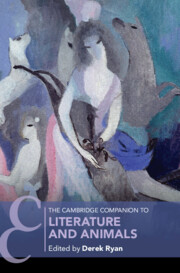Book contents
- The Cambridge Companion to Literature and Animals
- The Cambridge Companion to Literature and Animals
- Copyright page
- Contents
- Figures
- Contributors
- Introduction
- Part I Literary Periods
- Chapter 1 Middle Ages
- Chapter 2 Early Modern
- Chapter 3 Eighteenth Century
- Chapter 4 Romantic
- Chapter 5 Victorian
- Chapter 6 Modernist
- Chapter 7 Contemporary
- Part II Contexts and Controversies
- Select Bibliography
- Index
- Cambridge Companions To …
Chapter 4 - Romantic
Animal Bonds and Animal Death
from Part I - Literary Periods
Published online by Cambridge University Press: 26 October 2023
- The Cambridge Companion to Literature and Animals
- The Cambridge Companion to Literature and Animals
- Copyright page
- Contents
- Figures
- Contributors
- Introduction
- Part I Literary Periods
- Chapter 1 Middle Ages
- Chapter 2 Early Modern
- Chapter 3 Eighteenth Century
- Chapter 4 Romantic
- Chapter 5 Victorian
- Chapter 6 Modernist
- Chapter 7 Contemporary
- Part II Contexts and Controversies
- Select Bibliography
- Index
- Cambridge Companions To …
Summary
Romantic-era writing affirms the ideal of a bond between human and animal, while often showing this bond destroyed by the killing of the nonhuman animal. This chapter explores the treatment of such bonds, and their destruction, in the light of Mark Payne’s argument that literary representations of dying animals incorporate a sacrificial logic by which the nonhuman animal’s death enables the development of the fully human subject and the expression of that humanity in writing. In Samuel Coleridge’s Rime of the Ancyent Marinere, William Wordsworth’s Hart-Leap Well, Lord Byron’s Mazeppa, and William Blake’s "The Fly," I argue that elements of this "humanizing" process can be traced, but that the poems are characterized by ambivalence: too troubled by animal death, too uncertain about the efficacy of the message they attempt to draw from it, or in the case of “The Fly,” too wedded to the radical equivalence of all beings to be fully committed to a story of progress through sacrifice. The chapter ends with a discussion of John Clare’s badger poems and “To the Snipe,” in which there is a radical refusal of sacrificial logic.
- Type
- Chapter
- Information
- The Cambridge Companion to Literature and Animals , pp. 75 - 93Publisher: Cambridge University PressPrint publication year: 2023



